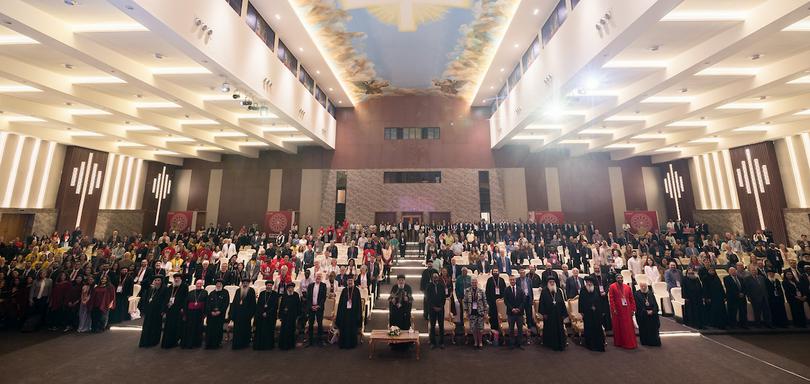On October 28, the Sixth World Conference on Faith and Order concluded in Wadi El Natrun, Egypt, with the blessing from His Holiness Pope Tawadros II of the Coptic Orthodox Church and the call to take action and witness.
Organized by the World Council of Churches (WCC), the event brought nearly 500 participants from 100 countries under the theme "Where Now for Visible Unity?" marking the 1,700th anniversary of the First Ecumenical Council of Nicaea (325 AD).
At the closing plenary, Pope Tawadros II remarked in his speech, "This gathering unites us in the spirit of Nicaea, the spirit of faith, reflection, a continual call to cooperation and love among all churches." He added, "True faith is the foundation of our unity and the unity of the church is the gift of the Holy Spirit, which we are all called to preserve through the bond of peace and love."
The pope said, "This unity can only be achieved through theological dialogue among the churches." He urged the participants to remember the fruit in theology and dialogue, which can be transformed into living action and witness in the world.
Mentioning Athanasius, the apostolic, faithful defender of the true faith, he presented every participant a gift from the Coptic Orthodox Church, which represents the lighthouse of Alexandria, one of the seven wonders of the ancient world. "On its four sides are inscribed the Nicene Creed in 20 languages, representing the entire Christian world." Although Christians read the same creed, they speak in different tongues. "This is a good expression about unity," he added.
Rev. Prof. Dr Jerry Pillay, general secretary of the WCC, asked the congregation a question – "What do you take back?" Rev. Prof. Pillay said the participants had captured a variety of themes and topics, some old and new, in the past days.
Before the closing plenary, the delegates showed orange and blue cards to decide the final document "Deepening Unity, Journeying in Love, Restoring Hope: Ecumenical Affirmation."
According to the document, as the Council of Nicaea in 325 acknowledged "one, holy, catholic and apostolic Church," the meeting celebrated the "progress made by the ecumenical movement, while recognizing the challenges that continue to confront us."
The document, consisting of "Ecumenical Affirmation" and "Call to All Christians," states three aspects in common faith, shared mission, and lived unity. It claims that the church should be declared and displayed "how to live faithfully in changing and varies contexts," the church should carry out the "dual mandate of proclaiming the gospel and engaging in service," and Christians "are called to live out our hope for this unity now, making it tangible and visible in one faith, witness and service."
It also calls Christians to "renew our commitment to faith, mission, and unity in Christ Jesus; to listen together to the Holy Spirit; to walk together as pilgrims: as children of the Father learning together to live out our faith, hope, and love, and in the practice of justice, reconciliation, and unity."
Rev. Dr Pillay commented on the approval of the document as a display of unity. "Coming together as 356 member churches is no easy task, when we come to consensus, especially on theology and doctrine, ecclesiology and church tradition," he said. But the only reason why the consensus was achieved was that "we are led by Christ and by the Spirit who helps us in the midst of all of these complexities to navigate our path in working together towards unity."
He continued with the question "what do we take back," adding that ecumenism does not stop at a conference door, but rather reaches the pews and speaks into every life.
"As we take seriously the prayer, 'Father, that they may be one,'" he called Christians to continue the together pilgrimage and transform disciples in a world which is "suffering and broken," yet "loved and reconcile by God."
Referring to the past days in the middle of a desert in Wald El Natrun, Rev Dr Stephaine Dietrich, moderator of the Faith and Order Commission, said that the members may have experienced a state of being desert during the conference, struggling amid great challenges, so an oasis is needed to "quench our thirst and stand together on fellowship."
"We've received the living water from the spiritual life every morning and evening." She also thanked for the hospitality of the local host, the Coptic Orthodox Church. "It has been a true experience of an oasis where everything is taken care of."
In addition, around 100 young people of the WCC Global Ecumenical Theological Institute (GETI) issued a message before the closing plenary, urging the church to "announce with prophetic courage the hope which dwells within us."
The Sixth World Conference on Faith and Order was held from October 24 to 28, consisting of thematic plenaries, different sections and workshops, a pilgrimage to Coptic monasteries, a Sunday confession worship, daily morning and evening prayer services, etc.












